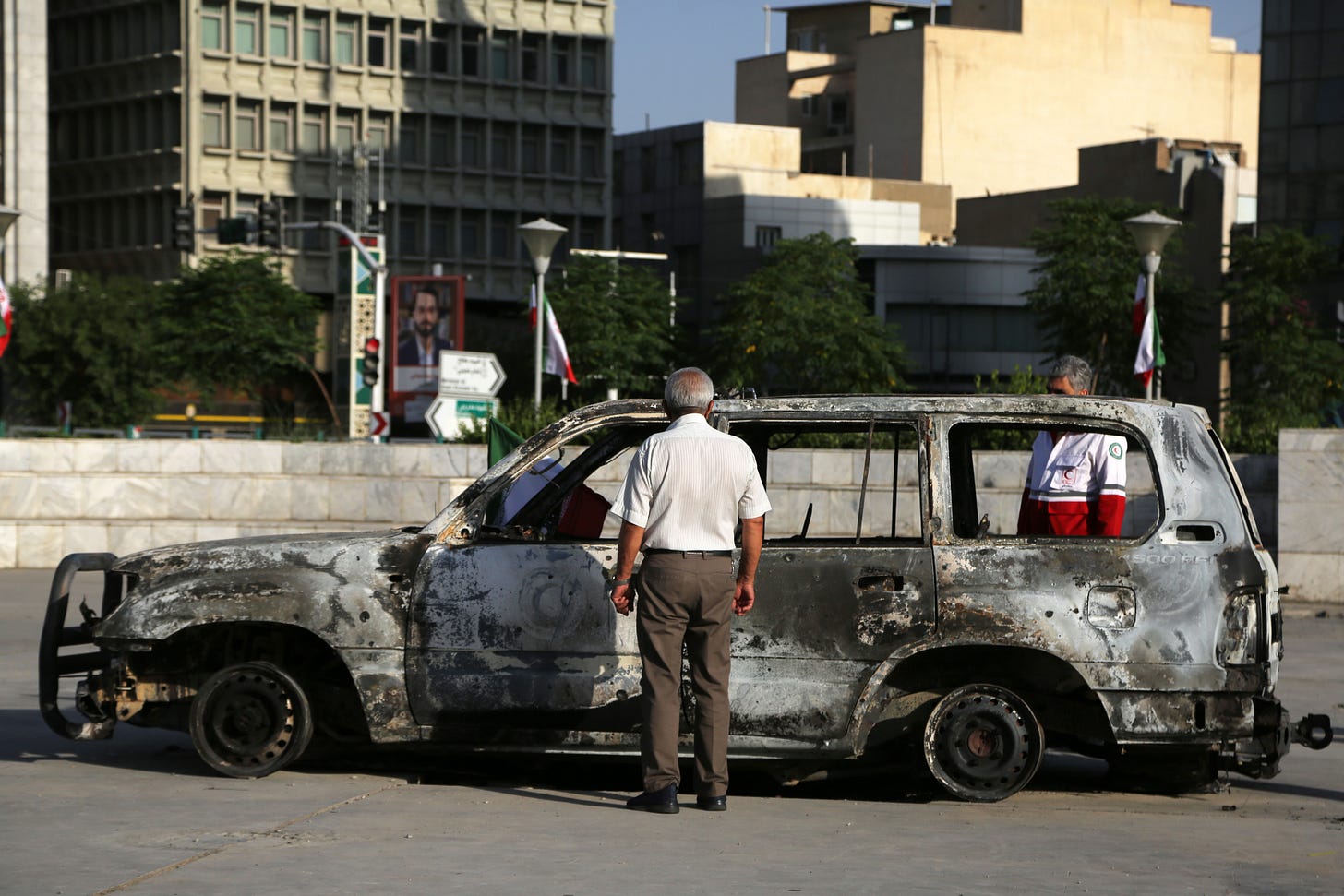A Letter From An Iranian
My family is in Tehran. Here's what this war means to me.
It is hard to avoid the feeling that we are entering a new era in the Middle East. To mark a week since hostilities began, we are publishing two personal essays—one yesterday by our Executive Director, David Hamburger, who found himself in Israel shortly before the war broke out; another today by an anonymous Iranian writer whose family lives in Tehran.
—The editors.
I am writing from a deep well of grief for my war-torn city, Tehran. It would be a lie to say we didn’t see this coming, especially given the long-standing threats and ambitions of the oppressive Islamic Republic of Iran—a regime that has, for decades, openly sought to annihilate Israel.
Even though grief and distress are a giant mass sitting on my chest, they’re not monolithic. They have many layers that hit differently and come with many uncertainties.
My entire family lives in Iran, mostly scattered across Tehran. My primary concern is for those in the affected areas. Some were able to leave the city, others stayed behind. Some are too old or ill to evacuate, others are without the means: no car, no money for gas or food. Most banks are closed. If you don’t already have a stack of cash at home, you’re in a dire situation.
When I called my aunt after the first strikes on Tehran, which killed several top government officials, she seemed at peace. I asked how she could be so calm in the midst of bombs dropping. Wasn’t she afraid that she and her children might be hit and die?
She said, “We don’t want war. But tonight, knowing that the men who’ve held us hostage for forty-six years, who’ve ransacked our country, raped and killed our daughters and executed our men for asking for their basic human rights, are finally getting what they deserve—that brings me peace.”
It’s not easy to hear a loved one speaking so plainly about their own death and destruction. But that’s what over four decades of oppression, pressure, and intimidation have done to the Iranian people. They are shocked and frightened by this war, but, somehow, they also feel like justice is being served.
War is an ugly business. Whether you think you’re on the right side or the wrong side, it’s never welcome.
Most people seem to be falling into two camps about the Israel-Iran war: those who are against it, and those who are satisfied, or even delighted, with Israel’s attack.
Among the first group are Western commentators and social media warriors who seem to be going through moral confusion about what sort of regime the Islamic Republic of Iran is. I constantly hear comparisons between what’s happening in Iran and what’s happening in Gaza.
Many of them see Israel solely as a genocidal colonial entity on the wrong side of history. They claim Israel has attacked Iran without any provocation, while the Islamic Republic is innocent and must be left alone. But this ignores that the Islamic Republic has terrorized not only its own people but also countries throughout the region, while funding and arming proxy groups like Hezbollah, Hamas, and the Houthis. Iranian people are stuck in a war imposed on them by their government’s violent rhetoric and actions.
I am not pro-Israel in a political sense. I am strongly opposed to the government of Prime Minister Benjamin Netanyahu. But I also believe Israeli people deserve to live peaceful lives, without having to worry that they’re surrounded by regimes calling for their annihilation. The Islamic Republic has openly called for the destruction of Israel and does not recognize Jewish people’s human rights.
How do I know this? Every morning for twelve years I stood in a schoolyard in Tehran and was forced to chant: “Death to America! Death to Israel!”
Many of those who hold Israel to a higher moral standard than Iran, while refusing to blame the Islamic Republic for its terrorist activities, are progressives with big hearts and good intentions. But they grossly lack nuance and an understanding of the geopolitical situation, regional history, and the struggles that both Iranian and Israeli people have been facing.
They view the conflict through their own limited lens of -isms (which I won’t bother unpacking here). They don’t want to be responsible for another mess on their guilty conscience. Even some in the Iranian diaspora have gotten on board and perpetuated the regime’s propaganda, driven by fear and patriotic rage. I don’t blame them—we humans are emotional creatures, and we don’t want to see people suffering, especially our own.
But there is deep complexity here that needs to be reckoned with. Is sudden, intense suffering from foreign missiles more merciful than prolonged, systematic oppression at the hands of your own government? When people have endured decades of oppression, does the source of their potential liberation matter as much as the liberation itself? And who bears responsibility when both action and inaction guarantee someone will suffer?
These complexities can’t be captured in social media soundbites or simple slogans. They are the impossible calculations that ordinary Iranians are being forced to make.
This brings me to the second group—those who support this war because they believe it will eliminate the Islamic Republic once and for all. They naïvely believe that once the regime is weak enough, people will rise up and come together to elect a democratic leader, and all will be well.
Maybe that is the case, but here lies the cruel paradox: can we guarantee that this war, which promises to end suffering, will actually deliver on that promise? And at what cost?
There are many recent examples of disastrous outcomes following regime change, such as the invasion of Iraq, the twenty-year democracy project in Afghanistan, and the Arab Spring. Even if we assume that this war has the potential to free the people of Iran from the tyranny of the Islamic Republic, one must think about the fallout. What happens once Israel completes its mission and destroys Iran’s nuclear infrastructure? The fears swirl: economic collapse, scarcity of resources, civil war, partition of the country, the rise of an ISIS-like terror regime, and many more that those with expertise can articulate more eloquently than I can.
Or the worst-case scenario: the Islamic Republic remains in power—stronger, bloodier, more emboldened—either by holding itself together or through negotiations with the United States. If that happens, the first thing the regime will do is retaliate against its own people by executing thousands in the name of rooting out “spies.” It will expand its oppressive machine, as it always has, by turning inward and crushing people. This is how the Islamic Republic survives: cannibalism.
That’s why I hesitate to put my name on this article. Being born under a dictatorship, fear becomes the fourth element in my blood alongside red cells, white cells, and plasma. If this scenario becomes a reality and the Islamic Republic remains standing, I do not want to put my family in any jeopardy. In the past few days, there have been reports that more than a dozen people have been arrested and one person has been executed for being “Israel’s spy.” Whether those reports are true or not, the fear is surely real.
And then there is my final concern.
Two days ago, I sent my mother a 3D ultrasound image of my unborn child along with “How are you?” A few hours later, I received a voice message: “Hi my dear. They’re hitting us. We can hear the sound of missiles dropping nearby. But nothing has hit us yet. And what a beautiful baby he is. I can’t wait to come see him when he’s born. Don’t worry. We’re fine.”
Since then, the Islamic Republic has imposed a nationwide internet shutdown and communication network restrictions. Even landline calls to Iran no longer work. Nobody really knows when or how this war will end, how many lives it will cost, or what the aftermath will mean for the people, the country, and the region.
As I write this last sentence, I wonder… was that the last time I will hear my mother’s voice?
The author of this article wishes to remain anonymous.
Follow Persuasion on Twitter, LinkedIn, and YouTube to keep up with our latest articles, podcasts, and events, as well as updates from excellent writers across our network.
And, to receive pieces like this in your inbox and support our work, subscribe below:




Reading this, I remember that I’m an American - an inheritor of the most extraordinary, the most crucial, the riskiest, and the most complex experiment in human society and government ever attempted - a nation born with, among other ideas, the then revolutionary notion that when Church and State were one, which had been far more the norm than not for over 4 millennia, it was actually not a good thing. I am of a nation to which millions fled to avoid that concept, only to find the idea not forgotten but only held at bay by a single phrase in one paragraph in an utterly revolutionary document.
A true understanding of that document ought to be the single most liberating force in history. Instead it has been discarded by the current leader of my country for much the same reason that motivates those who have so repressed the country from which this agonized letter comes. We ought to read this letter then as a warning as well as a plea.
Thank you for setting it straight. May the outcome be your mother's wishes!